Our History of Value Creation
Since its founding in 1920, the Nippon Soda Group has diversified into business fields such as agriculture, healthcare, the environment, and information. Furthermore, we have successively created products that meet the needs of the times. By using the power of chemistry to solve the issues facing society and by creating value with an eye on the future, we will continue to contribute to the creation of a society in which every person can live with peace of mind.
- Production Technology Capabilities
- Research & Development Capabilities
- Market Analysis Capabilities
-
大正2年 1913
Founder Tomonori Nakano received a patent for the Nakano method of salt electrolysis
-
大正3年 1914Societal Trends
World War Ⅰ
-
大正9年 - 昭和19年 1920-1944Founding Period Changes at the
Nippon Soda Group ①As demand for domestic manufacture of chemical products increased in Japan, Nippon Soda adopted a proactive management stance to overcome market uncertainties, leading to the research and commercialization of new products through technological innovations.
Net sales
-
大正9年 1920
Established Nippon Soda Co., Ltd. for business activities related to the manufacture of caustic soda and bleaching powder
Started operations at the Nihongi Plant (Joetsu City, Niigata Prefecture)
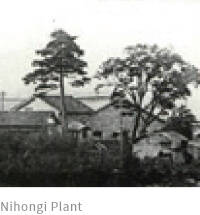
-
昭和4年 1929Societal Trends
Great Depression
-
昭和9年 1934
Started operations at the Takaoka Plant (Takaoka City, Toyama Prefecture)
-
昭和14年 1939
Established Nisso Shoji Co., Ltd.
-
昭和14年 1939Societal Trends
World War Ⅱ
-
昭和20年 - 昭和44年 1945-1969Early Period Changes at the
Nippon Soda Group ②In order to respond to post-war shortages of daily necessities and social changes during the period of high economic growth, Nippon Soda embraced the challenge of development and commercialization in various new and existing fields. As a result, Nippon Soda was able to both contribute to improved lifestyles and achieve business growth.
Net sales
-
昭和25年 1950
Established Sanwa Soko Co., Ltd.
-
昭和29年 1954Societal Trends
Period of high economic growth
-
昭和34年 1959
Established the Biology Research Laboratory*1 (Oiso, Naka-gun, Kanagawa Prefecture; integrated into the Odawara Research Center in 1984)
POINT①We were the first organization in Japan to build a private facility to assess the efficacy and toxicity of agrochemicals, and the facility garnered much industry attention. This facility later developed into the launch pad for many of our major agrochemicals, including the acaricides MIKAJIN and MILBEX and the fungicide TOPSIN.
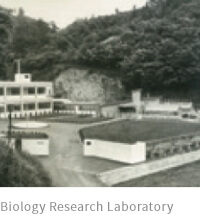
-
昭和40年 1965
Established Nisso Metallochemical Co., Ltd.
-
昭和42年 1967
Established Nisso Kensetsu Co., Ltd.
-
昭和44年 1969
Started production of the fungicide TOPSIN (thiophanate)
POINT②As society’s interest in lower toxicity agrochemicals grew, we developed the low-toxicity fungicide TOPSIN. Moreover, the chemical analog TOPSIN M became the first Japanese-produced agrochemical to be registered under the especially strict standards of the United States Environmental Protection Agency. This success helped to drive the increase in our export of agrochemicals.
Started production of the pharmaceutical additive NISSO HPC
POINT③Since its featuring in the Japanese Pharmacopoeia, uses of our pharmaceutical additive NISSO HPC have continued to increase, with it now being used as a raw material for cosmetics and a food additive. Today, we continue to reinforce our production capacity in line with increasing demand.
-
昭和44年 1969
Established Started operations at the Nisso Kasei Chiba Plant (currently the Chiba Plant; Ichihara City, Chiba Prefecture)
Started operations at the Mizushima Plant (Kurashiki City, Okayama Prefecture)
-
昭和44年 1969
Established the Agrochemical Synthesis Research Laboratory*1 (Odawara City, Kanagawa Prefecture)
-
昭和45年 - 平成6年 1970-1994Growth Period Changes at the
Nippon Soda Group ③Even in uncertain times, Nippon Soda was able to open up new growth areas through new product development that utilized the wide-ranging technologies developed since its founding. And, by enhancing its overseas hubs, the Company was able to build a foundation from which to spread its technologies worldwide.
Net sales
-
昭和45年 1970
Started production of the resin additive NISSO-PB
-
昭和47年 1972
Began capital participation in IHARABRAS S/A Indústrias Químicas (Brazil)
-
昭和48年 1973Societal Trends
First oil crisis
-
昭和49年 1974
Established the Fine Chemicals Research Laboratory*1 (Odawara City, Kanagawa Prefecture; developed into the Odawara Research Center in 1984)
-
昭和50年 1975
Established Shinfuji Kaseiyaku Co., Ltd.
-
昭和53年 1978
Established Nisso Engineering Co., Ltd.
-
昭和53年 1978Societal Trends
Second oil crisis
-
昭和54年 1979
Established the Haibara Farm (currently Haibara Field Research Center; Makinohara City, Shizuoka Prefecture)
-
昭和58年 1983
Established Nisso Metallochemical Co., Ltd.
-
昭和59年 1984
Established the R&D Laboratory for Functional Materials*2 (Ichihara City, Chiba Prefecture)
Established the Odawara Research Center*1 (Odawara City, Kanagawa Prefecture)
POINT④For the development of new agrochemicals, we have built a highly efficient system that brings together three research processes— compound synthesis, efficacy assessment, and safety research—at one location.
Established the Bandai Farm (currently Bandai Field Research Center; Bandai, Fukushima Prefecture)
-
昭和60年 1985
Started production of the acaricide NISSORUN (hexythiazox)
-
昭和60年 1985Societal Trends
Plaza Accord
-
昭和61年 1986
Established NISSO AMERICA INC.
-
昭和61年 1986
Started production of the fungicide TRIFMINE (triflumizole)
-
平成3年 1991Societal Trends
Collapse of the bubble economy
-
平成3年 1991
Participated in the establishment of Novus International, Inc. (US)
-
平成4年 1992
Established NISSO CHEMICAL EUROPE GmbH (Germany)
-
平成7年 - 令和6年 1995-2023Development
Period Changes at the
Nippon Soda Group ④As globalization advances and environmental awareness grows, Nippon Soda will look to grow its business through proactive global expansion and new product development. By applying its technologies to the advanced material and environmental fields, the Company is working to create new value and solutions to achieve further globalization.
Due to a change in accounting standards, reporting of net sales changed from a non-consolidated basis (Nippon Soda Co., Ltd.) to a consolidated basis as of FY 2000.FY 2023:Net sales¥172.8 billion
-
平成7年 1995
Started production of the insecticide MOSPILAN (acetamiprid)
POINT⑤As a result of our proactive efforts to make improvements to cater to frontline requests and acquire registration for use for minor crops, our insecticide MOSPILAN (acetamiprid) has grown into a major product that can be used against the main pests for a wide variety of crops. Due to its minimal impact on the environment, MOSPILAN (acetamiprid) is the only agrochemical of its kind whose active ingredient has been registered in the EU, and sales continue to grow.
-
平成9年 1997
Started production of the semiconductor photoresist material VP-POLYMER
Jointly developed the next-generation antibiotic faropenem sodium together with Suntory Ltd. (currently Suntory Holdings Limited) and Yamanouchi Pharmaceutical Co., Ltd. (currently Astellas Pharma Inc.), and started production -
平成11年 1999
Integrated the Nisso Kasei Chiba Plant (currently the Chiba Plant; Ichihara City, Chiba Prefecture)
-
平成11年 1999
Established Nisso Green Co., Ltd.
-
平成14年 2002
Established the R&D Laboratory for High-Functional Materials*2 (Ichihara City, Chiba Prefecture)
-
平成15年 2003
Started sales of the fungicide PANCHO TF (cyflufenamid-triflumizole)
-
平成16年 2004
Acquired the agrichemical business of Dainippon Ink and Chemicals, Inc. (currently DIC Corporation)
-
平成20年 2008Societal Trends
Financial crisis
-
平成22年 2010
Established the Chiba Research Center*2 (Ichihara City, Chiba Prefecture) (Integrated the R&D Laboratory for High-Functional Materials and the Production Technology Department of the Chiba Plant)
-
平成23年 2011
Established Nisso Namhae Agro Co., Ltd. (South Korea), a joint venture manufacturing company for active agrochemical ingredients
-
平成23年 2011
Acquired Alkaline SAS, a French chemicals manufacturer
-
平成24年 2012
Established Nisso Fine Co., Ltd.
-
平成24年 2012Societal Trends
European currency crisis
-
平成29年 2017
Started sales of the fungicide PYTHILOCK (picarbutrazox)
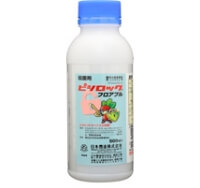
-
平成30年 2018
Acquired the plant health business of Zoetis Japan Corporation
-
令和2年 2020Societal Trends
COVID-19 pandemic
-
令和2年 2020
Started sales of the acaricide DANYOTE (acynonapyr)
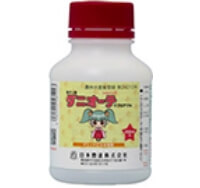
-
令和3年 2021
Started sales of the fungicide MIGIWA (ipflufenoquin)
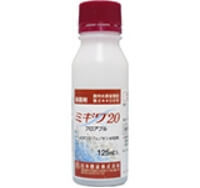
*1 Currently the Odawara Research Center
*2 Currently the Chiba Research Center


